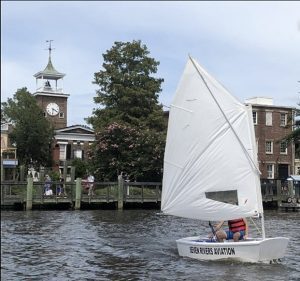Art
Smithsonian ‘Water/Ways’ Exhibit To Open At Maritime Museum in Georgetown
Water has been the driving force for Georgetown County for centuries, the economic elixir for industry and tourism, business and relaxation.
To that end, the county is defined by the waters that flow through its boundaries and crash onto its shores — four major rivers, the Winyah Bay and the Atlantic Ocean.
How appropriate, then, that the South Carolina Maritime Museum will host, from Sept. 28-Nov. 8, a Smithsonian Traveling Exhibition titled “Water/Ways.” The exhibit will explore and highlight the environmental and cultural impact that water has had on the county and its people.
“Water is an important part of everyone’s life, and we are excited to explore what it means and has meant economically, culturally, socially and spiritually in our own community,” SCMM Board Member Susan Davis said.
The exhibit, free and open to the public, will be housed on the second floor of the Maritime Museum, located at 729 Front Street in historic Georgetown. The museum is open Monday-Saturday from 11 a.m. until 5 p.m. Admission is free.
Held in cooperation with South Carolina Humanities, the “Water/Ways” exhibit is part of the Smithsonian’s Museum on Main Street program.
“The Maritime Museum is a star among attractions here on South Carolina’s Hammock Coast,” said Mark A. Stevens, director of tourism development for the Georgetown County Chamber of Commerce. “To add the distinct signature of the Smithsonian here for six weeks this fall is nothing short of amazing.”
By its very nature, the South Carolina Maritime Museum has long celebrated Georgetown and the Palmetto State’s important connection to water. Founded in 1996 by the Harbor Historical Association in Georgetown, the state’s first port and still South Carolina’s second largest port.
The museum is home to the prized Fresnel lens of the old North Lighthouse and several more permanent exhibits, as well as ever-evolving special showcases of maritime artifacts and memorabilia.
“Water/Ways” explores the endless motion of the water cycle, water’s effect on landscape, settlement and migration, and its impact on culture and spirituality. It looks at how political and economic planning have long been affected by access to water and control of water resources. Human creativity and resourcefulness provide new way of protecting water resources and renewing respect for the natural environment.
Interactive displays will let visitors experience the important and vital nature of water to our everyday lives. Designed for small-town museums, libraries and cultural organizations, “Water/Ways” will serve as a community meeting place to convene conversations about water’s impact on American culture.
“It would be hard to find a topic more central to South Carolina,” said Dr. Randy Akers, executive director of sponsoring organization SC Humanities. “Beyond the obvious fact that water is crucial for human existence, water plays a dominant role in the environmental, cultural, economic and historical fabric of South Carolina.”
The Maritime Museum will host a variety of community activities to coincide with the exhibit, including school art/literature contests, all of which will be announced on the museum’s website.
Some of the activities include four “History At Home” virtual presentations. An Oct. 3 session at noon will feature President Thomas Jefferson (as presented by Steve Edenbo), who will discuss, in period costume, when he commissioned the first Atlantic Coastal Survey (that led to the formation of NOAA), the waters of Virginia that are the beginning of the “highways of Colonial America,” and the assignment of the Lewis and Clark expedition.
In addition, North Inlet Winyah Bay Estuarine Research Center, Coastal Carolina University and Waccamaw Riverkeepers will all have accompanying exhibits at the museum during “Water/Ways,” as well as photographs commemorating the local fishing industry by Vennie Deas-Moore.
“Water/Ways” is part of the Smithsonian’s Think Water Initiative to raise awareness of water as a critical resource for life through exhibitions, educational resources and public programs. The public can participate in the conversation on social media through the hashtag #thinkwater. The traveling exhibit was inspired by an exhibition organized by New York’s American Museum of Natural History and the Science Museum of Minnesota, St. Paul, in collaboration with Great Lakes Science Center, Cleveland; The Field Museum, Chicago; Instituto Sangari, Sao Paulo, Brazil; National Museum of Australia, Canberra; Royal Ontario Museum, Toronto, Canada; San Diego Natural History Museum; and Science Centre Singapore with PUB Singapore.
Hope McFaddin, administrator at Georgetown’s Maritime Museum, notes that the “Water/Ways” exhibit is a perfect fit.
“Our museum’s mission is the promotion and preservation of the water and maritime culture and history of Georgetown County and the surrounding region,” McFaddin said. “What better way to showcase that than with a Smithsonian exhibit that’s all about the vital importance of water to our very being?”
The Maritime Museum has for three decades hosted thousands for the Wooden Boat Show in Georgetown, but, due to the COVID-19 pandemic, was forced to cancel the 31st annual event, originally set for October 2020. The acquisition of the Smithsonian was originally planned to coincide with the Boat Show.
“We are so happy to be able to still highlight our maritime heritage with the ‘Water/Ways’ exhibit,” Davis said. “Our museum strictly adheres to all COVID protocols and will provide visitors with a wonderful experience for the whole family.”
Collaborative organizations supporting the museum for the “Water/Ways” exhibit include the Georgetown County Chamber of Commerce and Department of Tourism, McClellenville Arts Council, Georgetown County Library System, Waccamaw Riverkeepers, Georgetown GBA, Gullah Geechee Chamber of Commerce, Hobcaw Barony, Coastal Carolina Department of Marine Systems Science, Georgetown Innovation Center, North Inlet-Winyah Bay National Estuarine Research Reserve, YMCA of Georgetown County, and the City of Georgetown, Vennie Deas Moore, and Vanessa Greene.
For more information about the museum and the “Water/Ways” exhibit, go to www.scmaritimemuseum.org.

























